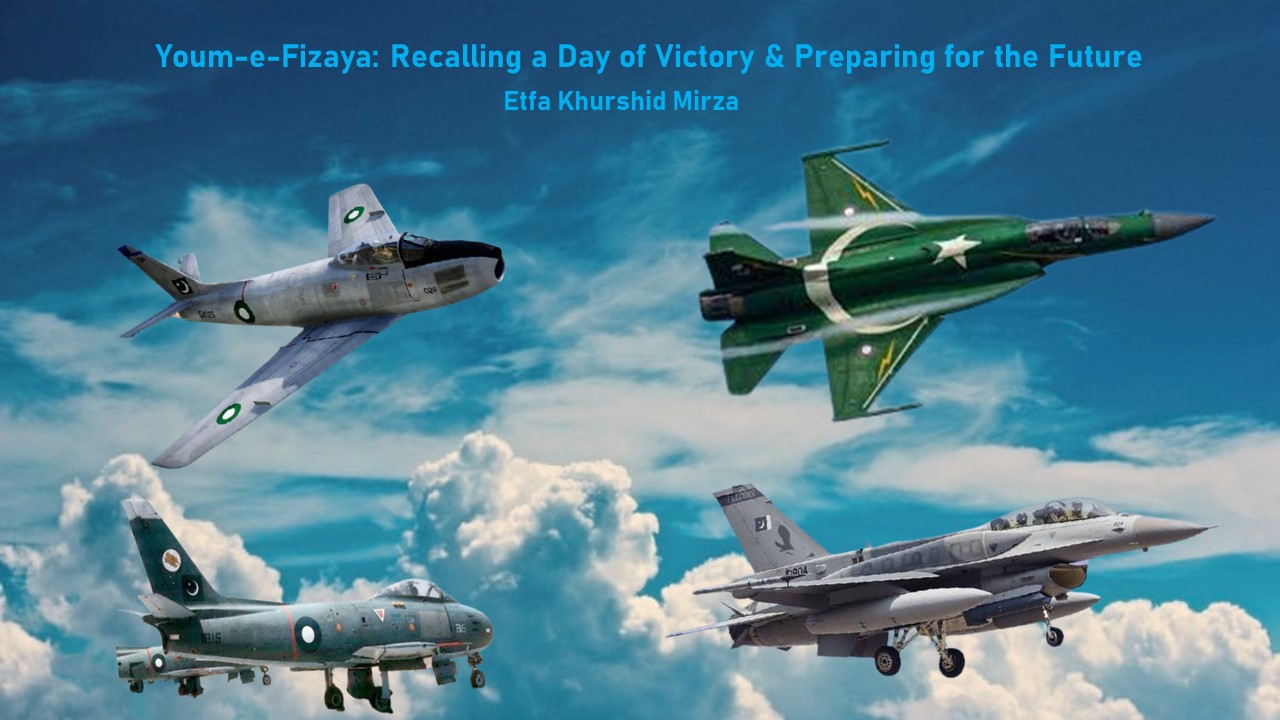Every year, September 7 marks Air Force Day, commemorating the bravery of those who sacrificed their lives; and those who fought tooth and nail in the 1965 India-Pakistan War to keep the green and white flag high. Since its inception, Pakistan Air Force (PAF)’s resolve has remained unshaken and in the words of our Quaid ‘Second to None.’ Even the enemy acknowledged this fact and gave PAF credit for its matchless victory in 1965. According to ‘The India-Pakistan Air War of 1965’ authored by Jagan Mohan and Samir Chopra, the official statistics released by the Indian Government accepted the loss of over 70 aircraft at the hands of PAF.
PAF not only remained undefeated in securing Pakistan’s aerial borders but also provided air support to the ground forces. On the other hand, Indian Air Force (IAF) not only failed to provide adequate support to the Indian Army, but also lost too many aircraft on the ground in the early stage of the war. For instance, the engagement at Pathankot paid a huge dividend for PAF strategic goals in the war and caused major damage to IAF not only physically but in terms of morale as well. This significantly contributed to raising PAF’s confidence throughout the war.
Heroes like Squadron Leader Sarfraz Rafiqui, Squadron Leader MM Alam and Squadron Leader Alauddin Ahmed led combat missions that resulted in the enemy’s destruction both in air and on the ground. Their inspiring leadership had a considerable impact on the overall conduct of the air war. That is why the PAF asphyxiated an overwhelmingly larger and better-equipped adversary. Our heroes set an example for those to come and the ones who followed their footsteps kept with the finest traditions of military leadership and gallantry in the face of overwhelming odds.
Fast forward to 2019, Wing Commander Noman Ali Khan and Squadron Leader Hassan Siddique following in their great predecessors’ footsteps embarked on a great victory over an enemy air force that was as before three times bigger in size. IAF had probably forgotten what happened to them in 1965 – PAF gave them a good reminder. Indian fighters intruded Pakistan’s air space negligent of the fact that PAF is always ready to give a befitting response. For IAF, the Balakot episode began with a string of failures, aimed at targeting a seminary from a stand-off range of 40 km on February 26th, their Spice-2000 bombs were dropped well away from the target hitting the ground on a hillside damaging a couple of trees. The next day, PAF taught them a lesson in the form of a well-calibrated response. The PAF chose six Indian military targets and hit slightly away from the infrastructure to avoid any escalation at a time when Indian warmongering was at its peak. The same day, PAF destroyed two Indian aircraft and captured one pilot alive, releasing him later as a goodwill gesture.
Be it 1965 or 2019, Indian leadership failed to plan well and what they planned was eventually squandered by disastrous execution. On the other hand, PAF remain ever ready and alert to defend Pakistan’s aerial borders. For the enemy, the message is very clear – if it dares cross its limit, PAF will choose its own time and place to teach a befitting lesson. In fact, given the Indian mind-set, such humiliation is always difficult to digest, and it is likely to resort to revenge. The Indian patterns reflect that whenever General Elections are approaching, the government uses its anti-Pakistan card to gain victory. In 2014, the Bharatiya Janata Party (BJP) applied soft Hindutva; and in 2019, it staged the Pulwama attack to achieve its electoral objectives. In 2024, India will once again have elections, and it is already preparing itself by acquiring weapons and war technology. Additionally, technology is also being used to wage hybrid warfare, including launching misinformation and disinformation campaigns against Pakistan.
Keeping India’s nefarious motives in mind, PAF must maintain its operational readiness at all levels so it can deter any aggression in the future as well. For this, Pakistan needs to invest in developing indigenous technologies to be competitive with Indian advancements and technology procurement. As a nation, we must utilize our potential in
industry and academia to promote Research and Development (R&D), and the government should also play an active role in developing policies that support indigenization of emerging technologies. Moreover, for long-term sustenance, investment in human resource and training is also crucial.
The author is a researcher at Centre for Aerospace & Security Studies (CASS), Islamabad, Pakistan. She can be reached at [email protected].





